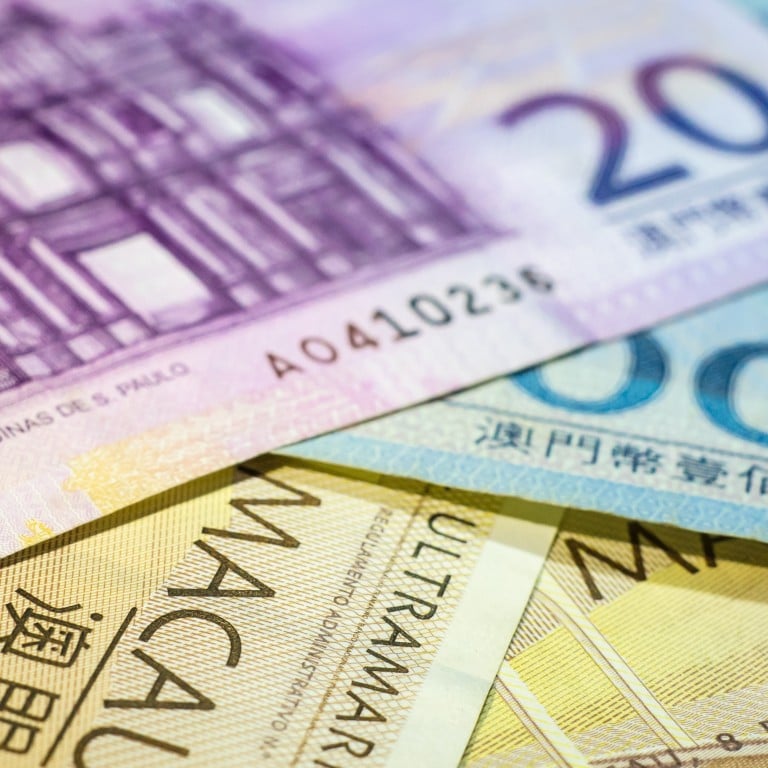
Explainer: Macau’s currency, fixed exchange rate and banking system
- Macau has 30 licensed financial institutions serving a city population of 672,000, a market dominated by China’s largest lenders
- The city is considered the second wealthiest place on earth on GDP per capita basis, and is poised to overtake Qatar in 2020, according to IMF
Hong Kong or mainland tourists seldom need to head to money changers when they visit Macau, as the Hong Kong dollar and the yuan are widely accepted by casinos, retailers and taxi drivers in the former Portuguese colony. As China marks the 20th anniversary of the return of Macau to its sovereignty, the challenge lies in elevating the local currency, known as the Macanese pataca, in international investment and trade, as the city outgrows its status as Asia’s top gambling hub.
What is Macau’s currency?
The Macanese pataca is identified by the MOP code assigned by the International Organization for Standardization.
The Monetary Authority of Macao (MAM) is the de facto central bank of the special administrative region, responsible for regulating the banking industry. There are 30 licensed financial institutions serving a city population of 672,000, dominated by China’s biggest lenders.
Only two commercial banks, namely Banco Nacional Ultramarino and Bank of China (Macau) are authorised to issue local bank notes.
The notes come in MOP$10 (pronounced as 10 patacas), MOP$20, MOP$50, MOP$100, MOP$500 and MOP$1,000 denominations, and are printed in both Chinese and Portuguese languages. The government mints coins in 10 avos (0.01 pataca), 20 avos, and 50 avos, as well as MOP$1, MOP$2, MOP$5 and MOP$10.
Local retail shops, restaurants, and taxi drivers have been accepting the Hong Kong dollar for decades, with both cities sharing a history of falling into the hands of Western imperialists. Many businesses have also accepted the yuan after it returned to Chinese rule in 1999, and the usage has accelerated amid a surge in mainland visitors in recent years.
How is it pegged to the Hong Kong dollar?
The Macanese pataca is pegged to the Hong Kong dollar at HK$1 to MOP$1.03 since 1983 through a currency board called the Linked Exchange Rate System. Under the system, whenever the two note-issuing banks print or redeem bank notes, they also make corresponding payments in Hong Kong dollar to the Monetary Authority of Macao.
Since the Hong Kong dollar is also pegged with the US dollar since 1983 at HK$7.80, the exchange rate between the pataca and the US dollar has also been anchored at around MOP$8.
How does the Monetary Authority of Macao manage its monetary policy?
The monetary authority adopts a policy like its counterpart in Hong Kong, which typically follows the US Federal Reserve policy rate decision in lockstep. Macau’s current base rate is about 2 per cent, the same as in Hong Kong, while commercial banks' prime lending rate is also around 5.375 per cent.
How big is the banking sector in Macau?
Among the city’s 30 financial institutions, 12 are locally-incorporated lenders while 18 are local units of foreign banks, mostly owned or controlled by mainland Chinese and Hong Kong banking groups. Most of them offer retail and commercial banking services. No big investment banks have set up shop locally so far.
The Bank of China (Macau Branch) is the largest in the city, with a total assets of MOP$680 billion at the end of 2018. It had a 40 per cent share of the loans and deposits in the city.
How big is the deposit base in Macau?
Total offshore yuan deposits in Macau’s banking system stood at 39.48 billion yuan, or 45.25 billion pataca, on October 31. As a comparison, that equals to only 6.2 per cent of such deposits in Hong Kong.

